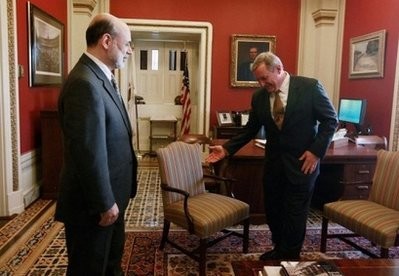WASHINGTON, Jan. 28 (AFP) – Federal Reserve chief Ben Bernanke won confirmation to a second term as the US central banker, despite sharp attacks on his role before the 2008 financial meltdown and in its aftermath.
After a bitter debate that roiled global stock markets, the US Senate voted 70-30 to approve Bernanke after easily dispatching an effort to block the nomination days before his term was to expire on Sunday.

President Barack Obama declared himself "gratified" by the vote and said Bernanke was needed because "while the worst of the storm has passed, its devastation remains and we have a lot of work to do to rebuild our economy."
Opposition to Bernanke -- who drew a historic number of "no" votes -- had led Obama and top aides to work the phones to court wavering Senators gripped by election-year populist pressures over the battered US economy.
His supporters said the central banker, 56, had pulled the world's richest economy back from the brink of a collapse like the Great Depression of the 1930s -- though many also noted he had not done enough to prevent the crisis.
Bernanke's "performance in addressing the economic crisis and his current efforts to significantly enhance financial regulation to help prevent future crises, outweigh his past mistakes," said Democratic Senator Carl Levin.
But some Democrats and Independent Senator Bernie Sanders, arguably the chamber's most left-leaning member, charged that Bernanke had crafted disastrous economic policies under George W. Bush, missed the signs of the coming crisis, and then placed the needs of Wall Street above Main Street.Related article:Bernanke struggled to avert crisis
Sanders argued the Senate should not "say to somebody who was asleep at the switch in terms of regulating our financial institutions: 'Congratulations, you failed, there's a major recession, you're getting reappointed!'"
Republican opponents accused Bernanke of being a key author of a hugely unpopular Wall Street bailout and a supporter of what they viewed as excessive government intervention in the US economy.
"From monetary policy to regulation, consumer protection, transparency, and independence, Chairman Bernanke's time as Fed Chairman has been a failure. The last time I checked, you don't get rewarded for failure," said Republican Senator Jim Bunning.
While Bernanke easily got the 51 votes needed for confirmation, he drew far more no votes than any other US Fed chief in history, more than in Paul Volcker's 84-16 confirmation vote in 1983.
Bernanke's troubles grew after a shock election result last week in Massachusetts, where little-known Republican Scott Brown harnessed a tide of voter economic anger to seize the Senate seat held for more than 45 years by the late Democratic icon Ted Kennedy.
That led a handful of senators facing reelection to come out against Bernanke, and forced the Senate's top Democrats and Bernanke to launch a charm offensive to allay their concerns and steer the nomination to success.
The number two Senate Democrat, Dick Durbin, emerged from a meeting with Bernanke saying that the central banker had agreed to promote "transparency and accountability" at the Fed and to work with lawmakers on new financial safeguards to protect consumers.
Durbin also said Bernanke backed a new economic stimulus package and acknowledged that "mistakes were made" leading up to the financial crisis, though the seeds of the collapse were sown perhaps "a decade or more" earlier.
A former Princeton University economics professor, Bernanke took over as Fed chief in February 2006, just before the collapse of the US housing market that triggered a global crisis of epic proportions.
Over the course of the debate, some of Bernanke's foes poked fun at Time magazine's decision to anoint him its 2009 "Person of the Year," noting that past winners included Adolf Hitler and Joseph Stalin.
"I congratulate him and hope he at least turns out better than those guys," said Bunning.
Market analysts gave a more measured response to Bernanke's confirmation.
Ryan Sweet at Moody's Economy.com said the Senate vote removed "some of the uncertainty about the path of monetary policy," and limited "the damage to the central bank's credibility."
























